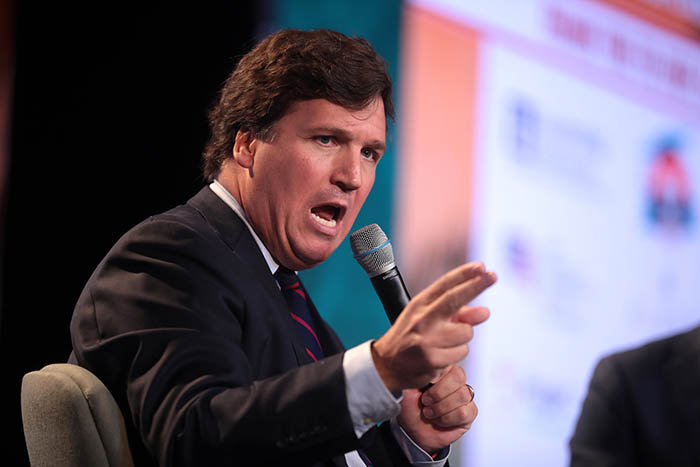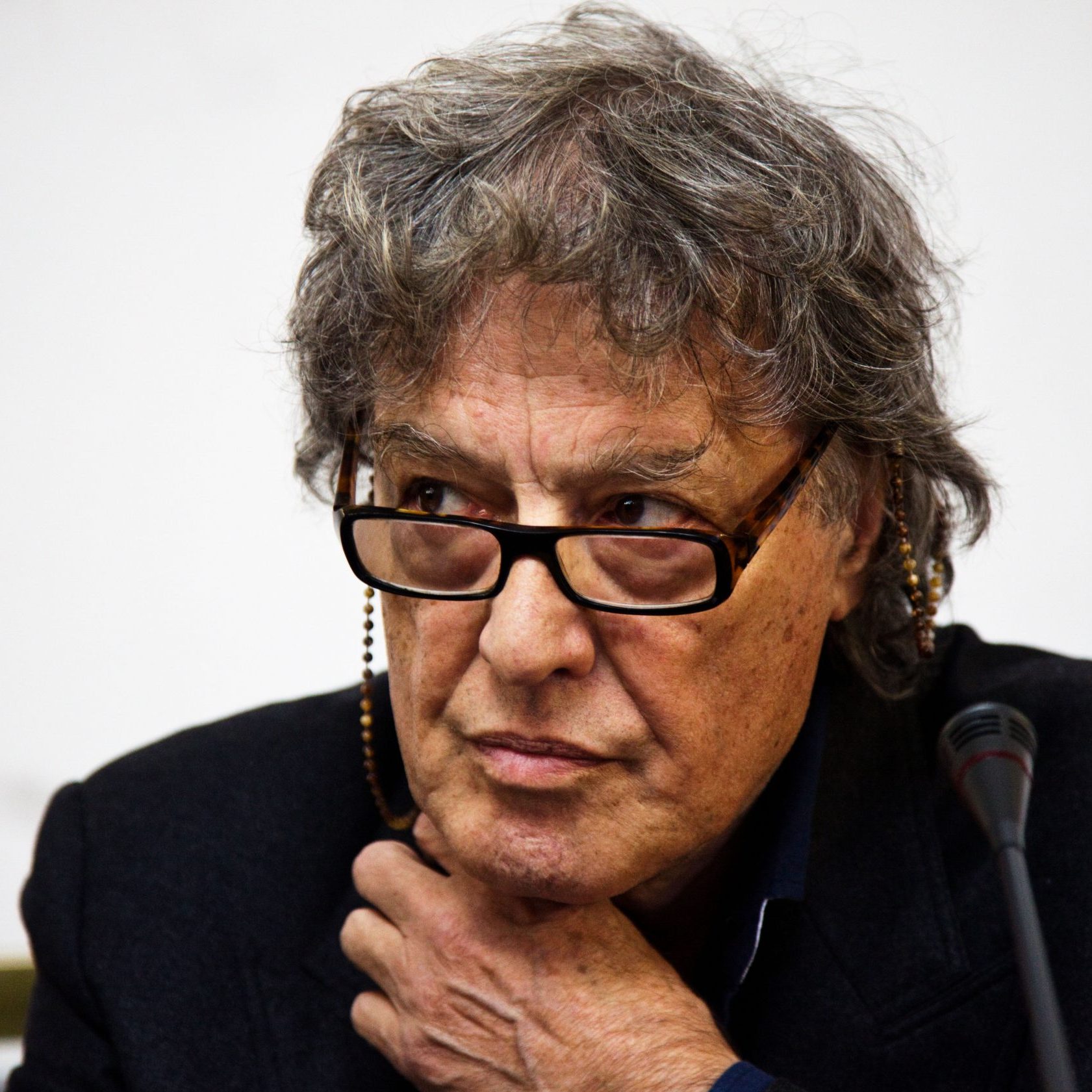[vc_row][vc_column][vc_single_image image=”106402″ img_size=”full” add_caption=”yes”][vc_column_text]When conservative Fox News commentator Tucker Carlson was invited to deliver the distinguished Roy H Park Lecture at the University of North Carolina at Chapel Hill’s journalism school, outrage exploded online.
Current and former students offered fierce criticism of the choice, especially on Twitter where some called Carlson racist and a propagandist. Many said they were disappointed and ashamed. Carlson, people criticised, was not a journalist, but an entertainer. What business did he have speaking to budding journalists? Others pointed to Carlson’s comments about immigrants — they make the US “poorer and dirtier” — and his critiques of diversity, as well as his use of language, critics say, upholds white supremacy.
Despite the backlash, the school moved forward with the lecture, which was largely uneventful. Students and faculty listened. Some audience members asked pointed questions. And then it was over.
That’s how John Robinson, a professor at UNC-Chapel Hill’s journalism school, remembers it. He understood the outrage but said it was a teachable moment.
“Students aren’t snowflakes. They understand BS when they hear it,” he said. “I just don’t see any evidence that students are intolerant of others’ views when it comes to speakers.”
Yet last month US President Donald Trump signed an executive order to uphold freedom of speech on college campuses in response to a supposed “crisis”.
“Under the guise of speech codes, safe spaces and trigger warnings, these universities have tried to restrict free thought, impose total conformity, and shut down the voices of great young Americans like those here today,” Trump said during the signing ceremony, surrounded by predominantly white students in conservative organisations.
Not much is changing. The order encourages universities to “foster environments that promote open, intellectually engaging, and diverse debate” through the First Amendment — freedom of speech. It requires that universities receiving federal research or education grant money must “promote free inquiry”.
But public universities in the US already have to uphold the First Amendment if they receive funding from the federal government. Further, some academics are arguing that the order could actually hurt freedom of speech by causing universities to self-censor who they invite to campus.
In a survey conducted by professor Tori Ekstrand of UNC-Chapel Hill students, 86 per cent said the university should invite speakers with a variety of viewpoints to campus, including those whose perspectives vary from their own. On the national level, the Knight Foundation found that extreme actions, including violence and shouting down speakers, are largely condemned.
So, who is Trump protecting?
In early April, three students from the University of Arizona protested an on-campus presentation by U.S. Customs and Border Protection agents, calling them a “murder patrol” and “an extension of the KKK”. All three students were charged with misdemeanours by police: “interference with the peaceful conduct of an educational institution”; one of the students was also charged with “threats and intimidation”. A county prosecutor has yet to decide if a prosecution will go forward.
Trump has not commented on the incident, but many are following the case because it is unusual for arrests to follow a nonviolent protest, especially one on campus. Commentators have said the strong reprimand was a result of the recent order.
The case in Arizona relates to a larger issue on campuses: punishing students who protest. In 2017 the Goldwater Institute, a conservative think tank, published a report arguing that freedom of speech is under attack on American college campuses — citing “shout downs” that interrupt speakers, safe spaces and restrictive policies. The group created a model bill, establishing punitive measures for students and others who interfere with free-speech — essentially punishing protesters on campus. It also prevents administrators from disinviting speakers, no matter how controversial. Many states, including Arizona and North Carolina, have adopted versions of the Goldwater bill.
In a report on the bill, the American Association of University Professors put it bluntly: the legislation “seeks to support what it sees as the embattled minority of conservatives on campus against the ‘politically correct’ majority”.
And for those who find themselves outside the conservative viewpoint?
“It’s an attempt at intimidation,” said Michael Behrent, vice-president of the AAUP’s North Carolina conference. “The argument is to try and force members of the progressive left … to make them feel threatened and endangered, rather than an attempt to outright block their free speech.”
A chilling effect. And this isn’t the first time Trump has attempted this. In 2016, Trump said he planned to change libel laws to make it easier to sue news organisations. The same year, he threatened to imprison or revoke the citizenship of those who burned the flag.
“What we see coming out of his legacy is this notion of protecting conservative speech,” said Kendric Coleman, a professor at Valdosta University who studied the role of safe spaces in the LGBTQ+ community. Trump “is trying to redefine harassment speech into free speech”.
Technically, hate speech is protected by the US constitution, as long as it doesn’t incite violence. But detractors say some speakers — like white nationalist Richard Spencer, who has been disinvited from a number of events and universities — may actually cross the line into incitement of violence.
But some university administrations are hesitant to actually define the line between protected free-speech and incitement to violence. And with new policies coming from the state and federal level, with the intention of protecting free-speech, that line may only become more blurry.
At the heart of the debate lies this question: Should speech that is harmful to certain groups be protected? In the survey conducted by Ekstrand, 93 per cent said others should be allowed to express unpopular opinions on campus. But that number drops to 61 per cent when that speech is offensive to others.
The Knight Foundation also found that American students consider both protecting free-speech and promoting inclusivity as important to democracy. But only 37 per cent of students identifying as Republican said that it is “extremely important” to promote inclusivity — compared to 63 per cent of Democrats.
This is where policies like Trump’s executive order and the Goldwater bill lie. While the left prioritises inclusivity at the expense of free speech, the right resists in opposition.
At stake remains whose voices receive protection, and whose get censored. [/vc_column_text][/vc_column][/vc_row][vc_row][vc_column][vc_basic_grid post_type=”post” max_items=”4″ element_width=”6″ grid_id=”vc_gid:1556180903639-20dca59b-8321-10″ taxonomies=”8843″][/vc_column][/vc_row]





